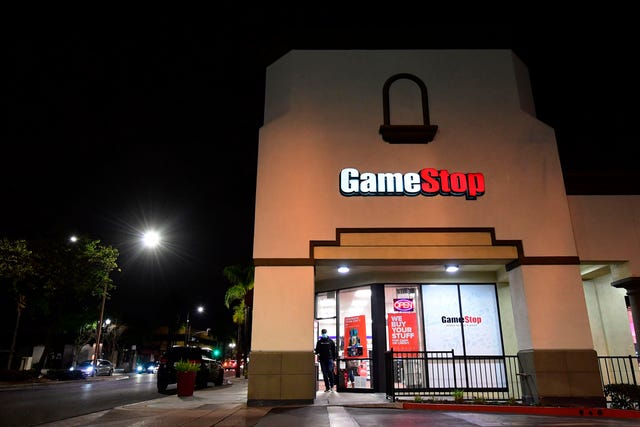[ad_1]

FREDERIC J. BROWNGetty Images
- A group of angry Redditors have caused billions of dollars of damage to hedge funds shorting GameStop stocks.
- In 2008, Porsche gobbled up so much Volkswagen’s stock it caused VW’s stock prices to soar, which similarly caused short sellers to lose tens of billions of dollars in a span of a couple days.
- The result of the current short squeeze could be increased regulations over retail traders.
Even if you don’t follow stock market news, you’ve probably been inundated with news with what’s happening to GameStop stock on social media. The situation is almost as unprecedented as it is alarming, at least to hedge funds and institutional investors, and it’s perhaps the start of something entirely new in the financial world—a situation in which crowdsourcing has mobilized millions of small-time traders to cause billions of dollars worth of damage to hedge funds.
And at its core, it’s not dissimilar with what Porsche had done a decade prior with Volkswagen stock.
In a nutshell, the GameStop short squeeze began when retail traders in a subreddit—not investment bankers but just people bored of the coronavirus lockdowns—got fed up with a hedge fund that was shorting GameStop stock. GameStop had been trading at a fairly low price and was expected to drop further. The premise of shorting by hedge funds essentially involves the funds betting on a stock dropping in price in the long term, and making money by borrowing shares of stock for a fee and then selling these shares to buyers who could pay a lower price. This can drive the market price of the stock down, and at that point the hedge funds would buy the stock back for less money, keeping the difference minus any fees paid to those who they’ve borrowed it from.
If the short works out as planned, the hedge funds profit, but when it doesn’t and the price of the stock goes up for some reason, the damage to the fund can be colossal.
But one thing that hedge funds didn’t hedge against in the GameStop case are thousands of small traders on Reddit who had noticed a number of stocks being shorted by hedge funds that had been essentially preying on troubled companies during a recession. GameStop, a mall-based video game store suffering from both reduced foot traffic and the growth of online games during the pandemic, was seeing its stock decline due to these natural market conditions. (Of course, when a stock is being shorted or a short squeeze is occurring, the companies themselves, GameStop in particular, have nothing to do with the situation and are basically along for the ride).
What started happening a few days ago is that the effort of Redditors to drive GameStop’s stock price up began working, inching the price of the stock upward, and hedge funds got caught on the wrong side of their bet. Melvin Capital Management, the hedge fund in this case, had to start buying the same stock at a higher price because it had to cover its short. The stock price had gone from about $20 at the start of 2021 to more than $347 before the close of trading on Wednesday.
Meanwhile, GameStop stock price kept going up because it was attracting attention from other traders, creating a snowball effect, with more traders joining in to make some money on its way up.
As unprecedented as the situation seems at the moment—and it is, since such coordination among retail investors has been rare—it’s similar to something that happened to Porsche and Volkswagen more than a decade ago, though for different reasons.
The starting point for the short squeeze at that time was Porsche’s desire to accumulate more voting rights in Volkswagen. It did so by buying up VW shares in an effort to gain a greater foothold in the company, which at the time was a frequent but unrelated business partner. As Porsche started buying up VW shares, seeiking more voting rights and control of the board, VW stock price continued to inch up through 2006 and 2007, going from about €30 in 2005 to over €150 by 2007, seemingly absent any outside reason. The stock began to appear massively overvalued, and hedge funds took notice and began shorting the stock, betting that it would go down eventually.
The squeeze itself happened in late 2008. By that time VW became the most valuable automaker on the planet thanks to its stock price having skyrocketed, while the short position had ballooned to 12% of outstanding shares. The kicker was, Porsche had owned 43% of VW shares and also another 32% in share options. The German government, however, owned another 20.2%. This left very little that could be purchased by anybody else. This disparity caused short sellers to rush to buy more stock to cover their positions, driving the stock price further still through the month of October 2008, with VW stock price now hovering just above €900, and at one point exceeding €1,000 in intraday trading.
The end result was that hedge funds that had been shorting VW stock had lost some $30 billion in the process. The result for Porsche was that it had been able to make billions in just a few weeks at a time when the auto industry was doing exceptionally badly in car sales.
Porsche had effectively made more money in trading stock than in selling cars—and it’s not dissimilar with what has been happening with Tesla stock in the recent months, either, with Tesla becoming the world’s most valuable automaker. The common thread is that those who had been shorting Tesla stock over the past few years have absorbed significant losses in the process, spread out over a longer period of time.
Is there a moral to this story? Perhaps it’s that hedge funds are now far more vulnerable to sudden and artificial stock rallies when it comes to stocks that they had been shorting for months or years, betting on troubled companies to lose stock value in difficult financial times. A much smaller company than VW, Porsche had made a lot of money in a short period of time due to hedge funds betting on VW losing money. In the case of GameStop, the rally was prompted by a large number of small retail traders willing to wager and even lose hundreds of dollars in an effort to create a short squeeze that would hurt big hedge funds, and some of these traders have become millionaires in a matter of days by investing tens of thousands of dollars into the effort, and then bailing out.
Perhaps another moral of the story, one that could materialize relatively soon in response to this debacle for hedge funds and institutional investors, could be heavier regulation of retail traders—not the big banks or hedge funds. That’s a pessimistic view for sure, since very little regulation emerged in the aftermath the 2008 financial crisis. Still, that punishment could come down on small-time traders sitting at home, as hedge funds run to the government screaming for help as AMC theaters and BlackBerry stock are appearing in the sights of the Reddit trader army.
This content is created and maintained by a third party, and imported onto this page to help users provide their email addresses. You may be able to find more information about this and similar content at piano.io
[ad_2]
Source link


